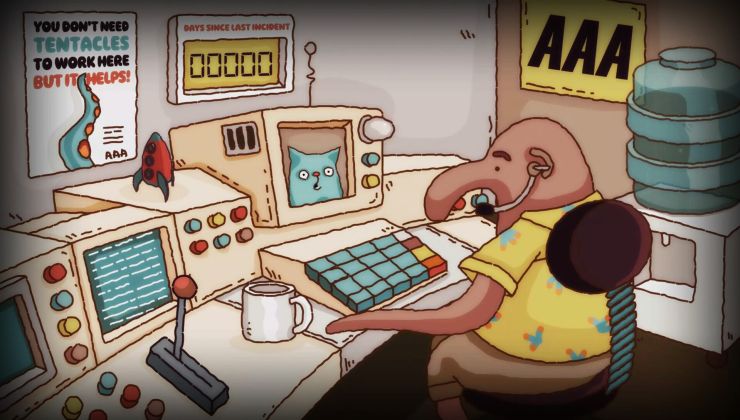How do you know Linux is gaining steam outside of the usual circles? When you see writers like Jason Evangelho from Forbes switching over to Linux and writing about his experience.
He's been writing about Linux since early July, his reasoning for trying out Linux I'm sure will sound familiar to anyone who has used Windows often:
A few weeks ago during a time-sensitive 350GB file transfer, Windows 10 rebooted without warning. When the OS restarted I was greeted with an infuriating blue screen that had become all too familiar. No, not that infuriating blue screen. The one that declares "Working On Updates." It was, as they say, the last straw. After two decades of relying on Windows I finally decided it was time for the nuclear option.
He continues on to talk a little about his experience, including Linux Mint having an off day not finding a drive to install on. However, that didn't stop him, whereas I'm sure other writers would have then gone off on a rant he simply picked a different distribution (Ubuntu). Usually, when I see such writers on major news websites writing about Linux, it ends up coming across as a pretty disappointing read as if they've set themselves up not to like it. So it was incredibly refreshing to see him have a little patience to push through it. It's the same for anything that's new to you, if you're not prepared to learn a little—you will probably fail.
The latest article, titled Gaming On Linux: 2 Ridiculous Myths And 2 Brutal Truths, features yours truly after we had a bit of a chat. We went over the usual points, most of which will be well-known to our regular readers and people who've been using Linux for a long time. Still, some of it felt important to actually get across to a wider audience. This is why I appreciate Evangelho's writing, because he reached out to people in the community for feedback and help. To make sure he actually understood various upsides and downsides of using Linux for work and play. Although, it's slightly amusing how I mentioned Wine a little and then along comes Valve with Steam Play.
It's really fantastic to see more people on major websites actually try Linux for themselves and have a positive experience. More like this please.
Last edited by Power-Metal-Games on 4 Sep 2018 at 1:12 pm UTC
* Actually not that loud and not that wide, my comment was more of a southern hyperbole than an analysis on Forbes' articles xD
Last edited by Arehandoro on 4 Sep 2018 at 1:15 pm UTC
But the fact that it lets you opt out of data collection at first launch instead of asking you to opt in still doesn't feel right. It's not the Linux way, if I have any authority to say so myself.
The platform really is in an incredible place at the moment - especially as the writer mentions only ten years ago we mostly had penguin-themed games to play (not that I didn't enjoy many hours of bobsledding in Tux Racer!). There's now so much to choose from!
If you want to be a gamer on linux in the sense that you want to use linux and find games you like, there's really no reason not to switch. Pretty much every genre is represented, with many games of each, and even some AAA games at comparable performance. Wine will take care of almost any classic titles if you want that nostalgia factor.
If you want to be a gamer in the sense of being on the cutting edge and keeping up with the latest trends and technologies in gaming, then maybe Linux isn't for you, or not as your main gaming OS. If you want access to <i>specific</i> titles, it can be problematic, and even when there are ports, they're often late by a month or two, which also applies for updates and DLC to those games. I get that for some people this is a really important part of their hobby, and in this instance Linux doesn't work for them.
Instead, what I try and share with people about Linux is the freedom it offers - I'm in full control of what's on my computer, and it's never going to do anything like what the author mentions and force an update at an inconvenient time (and if for some reason any distro tries that, you can all but guarantee there will be a fork that doesn't within days). That freedom includes so much software and many games to choose from that I'll never feel like there's something I can't do, or a type of game that I can't play with my computer.
While I'm grateful for Wine, and Steam Play, and their associated technologies, sometimes I think focusing on them (the "Brutal Truths" ) holds us back from talking about what the platform really has to offer. What do y'all think?
EDIT: This post isn't really directly in response to the linked article, but something I've been mulling over for a while brought to the forefront of my mind after reading it.
Last edited by dodrian on 4 Sep 2018 at 3:34 pm UTC
I had another older computer that needed a fresh OS install, so I put KDE Neon on it. The whole process from start to finish took about 30-minutes, and it "just worked".
I hate Windows.
https://spcr.netlify.com/
Maybe a little bit more useful than the Google Docs sheet. ;)
Thanks to this page it is now very easy to check your own library against the tests.
It's always nice to see how productive the community is working together. That's why I love Linux and other free systems.
Last edited by 1xok on 4 Sep 2018 at 3:20 pm UTC
While I'm grateful for Wine, and Steam Play, and their associated technologies, sometimes I think focusing on them (the "Brutal Truths" ) holds us back from talking about what the platform really has to offer. What do y'all think?I see it as managing expectations. You give something a glowing review and pretend it doesn't have any flaws, people will feel betrayed and be that much quicker to bash it. You tell them right off the bat about the issues that exist and the choices they need to make, and they'll be ready to face and accept them if they do decide to try it out (and if they don't, they won't feel personally let down by the shortcomings).
To me it would be a much graver mistake to go around claiming that "Steam can now play thousands of Windows-only games!" and leave it at that than to say "Steam can now run thousands of Windows titles with acceptable performance, subject to your system specs." The caveat may not be as shiny, but I think there's value in being open and honest instead of trying to make things look better than they really are (even if it's just by omission).
I wonder if we should be talking about gaming on linux in a slightly different way.
The platform really is in an incredible place at the moment - especially as the writer mentions only ten years ago we mostly had penguin-themed games to play (not that I didn't enjoy many hours of bobsledding in Tux Racer!). There's now so much to choose from!
If you want to be a gamer on linux in the sense that you want to use linux and find games you like, there's really no reason not to switch. Pretty much every genre is represented, with many games of each, and even some AAA games at comparable performance. Wine will take care of almost any classic titles if you want that nostalgia factor.
If you want to be a gamer in the sense of being on the <i>cutting edge</i> and keeping up with the latest trends and technologies in gaming, then maybe Linux isn't for you, or not as your main gaming OS. If you want access to <i>specific</i> titles, it can be problematic, and even when there are ports, they're often late by a month or two, which also applies for updates and DLC to those games. I get that for some people this is a really important part of their hobby, and in this instance Linux doesn't work for them.
Instead, what I try and share with people about Linux is the <i>freedom</i> it offers - I'm in full control of what's on my computer, and it's never going to do anything like what the author mentions and force an update at an inconvenient time (and if for some reason any distro tries that, you can all but guarantee there will be a fork that doesn't within days). That freedom includes so much software and many games to choose from that I'll never feel like there's something I can't do, or a type of game that I can't play with my computer.
While I'm grateful for Wine, and Steam Play, and their associated technologies, sometimes I think focusing on them (the "Brutal Truths" ) holds us back from talking about what the platform really has to offer. What do y'all think?
EDIT: This post isn't really directly in response to the linked article, but something I've been mulling over for a while brought to the forefront of my mind after reading it.
I always bring up freedom and security first. In fact, I don't sell it on what Linux does do, but what it doesn't do.
Linux does not backdoor its disk encryption.
Linux does not forcibly impose system changes.
Linux does not gather massive amounts of telemetry data.
Linux does not censor apps from its repositories.
Linux does not have a universal backdoor.
etc, etc
I wouldn't care if only ten crummy games ever existed for Linux, I would still choose it as my gaming platform because I refuse to let proprietary software make me it's bitch.
My wife recently bought a new laptop with Windows preinstalled. I spent a couple of hours uninstalling all the junk software that it came with and configuring the OS so that she could use it.But if you uninstall ALL junk from Windows, you'll get this:

Congrats on becoming our de facto industry spokesperson, we couldn't have made a better choice. Also appreciated your down to earth answers in the article.Well, it took a lot of blood sweat and at times tears to get here :P
When Phoronix often talks about 100+ hour weeks with his site, well, he's not kidding. I would say my average week just doing this is around 60-70 hours a week. The problem is, half of what I do just isn't seen. Talking to developers, getting the word out speaking to people for things like this, giving developers advice, testing games before release and so on. It all adds up on top of actually getting stuff written to display to people to show for it all.
Edit: words, wrong, something
Last edited by Liam Dawe on 4 Sep 2018 at 3:32 pm UTC
If you want to be a gamer in the sense of being on the cutting edge and keeping up with the latest trends and technologies in gaming, then maybe Linux isn't for you, or not as your main gaming OS.
I might be dreaming, but Proton might change that. What I mean is that might come a day when initial releases of AAA titles will include a "Steam Play Ready" mention (meaning collaboration between Valve and the gaming studio).
Ok, I probably just put my rose colored glasses on... :)
Personally, I've converted my mother to Linux a couple years back. (Not quite selfless, as it cut back on the computer support quite a bit). Last time I visited, I upgraded her laptop to Ubuntu 18.04 (from 16.04), switching to Gnome in the process, and I was a bit concerned that those changes would cause her some discomfort. Last time I rang her up, I asked how it went with the new system, and she says it's the best upgrade she has ever had (she really likes the Night Light mode).
My take is that for everyone doing simple tasks (web, mail, simple office stuff, photos), Linux has been ready for the job for ages. The problem is, most of those people aren't able to install an OS of any kind, so unless they have a friendly soul to help them (or they can buy hardware with Linux pre-installed), they will always be stuck with Windows.
Last edited by kaiman on 4 Sep 2018 at 5:11 pm UTC
An acquaintance recently told me he had removed all the privacy-violating crap from his Windows 10 laptop, to which I quipped "well, what you know about at least." He insisted that he went deep into the system ripping things apart and didn't just change the user-facing settings, but I didn't have time to enquire further. I would have liked to ask why he would go to that much trouble if he was really concerned with privacy (he also uses ProtonMail) instead of just using Linux.My wife recently bought a new laptop with Windows preinstalled. I spent a couple of hours uninstalling all the junk software that it came with and configuring the OS so that she could use it.But if you uninstall ALL junk from Windows, you'll get this:

An acquaintance recently told me he had removed all the privacy-violating crap from his Windows 10 laptop, to which I quipped "well, what you know about at least." He insisted that he went deep into the system ripping things apart and didn't just change the user-facing settings, but I didn't have time to enquire further. I would have liked to ask why he would go to that much trouble if he was really concerned with privacy (he also uses ProtonMail) instead of just using Linux.
"Habbits are strong with this one." :)
An acquaintance recently told me he had removed all the privacy-violating crap from his Windows 10 laptop, to which I quipped "well, what you know about at least."
German authorities found that Microsoft is not able to provide them a Windows 10 version (not even a special one!) that is not sending home encrypted data without a real explanation. Which makes its use illegal (edit: for them) in theory.
Last edited by Eike on 5 Sep 2018 at 10:02 am UTC
An acquaintance recently told me he had removed all the privacy-violating crap from his Windows 10 laptop, to which I quipped "well, what you know about at least."
German authorities found that Microsoft is not able to provide them a Windows 10 version (not even a special one!) that is not sending home encrypted data without a real explanation. Which makes its use illegal in theory.
Would you mind providing a link for this, please? I'd like to create some "fireworks" back in the office tomorrow... xD
Would you mind providing a link for this, please? I'd like to create some "fireworks" back in the office tomorrow... xD
I've only got a German one...
https://www.heise.de/newsticker/meldung/Behoerden-ignorieren-Sicherheitsbedenken-gegenueber-Windows-10-3971133.html
(If I find time I'll look for more.)













 How to set, change and reset your SteamOS / Steam Deck desktop sudo password
How to set, change and reset your SteamOS / Steam Deck desktop sudo password How to set up Decky Loader on Steam Deck / SteamOS for easy plugins
How to set up Decky Loader on Steam Deck / SteamOS for easy plugins
See more from me